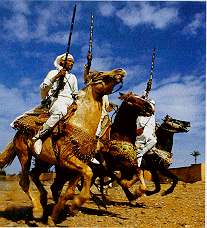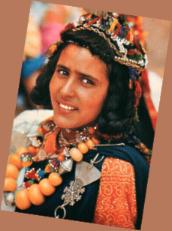
From Siwa to Gomera!
Geography | Fauna & Flora | Imazighen | Tamazight Course | Arts & Artists | Maghreb or Tamazgha?
Had I to rely on what my country wanted to tell me about it's own past I would have beleived the insane story that North Africa is nothing but a ridiculous extension of the Middle East. The lies on our past that were taught with so much stupidity in Moroccan schools and colported trough such low quality media as the National Television Broadcast, without counting the 1001 prejudice lead me to think I was really originally from the Arabic peninsula, more than 5000 kilometer East of my birth land.

Berbers are making up a
clear majority of the population
of North Africa in terms of race
and in terms of identity, a
considerable minority. The
difference between race and
identity here is central to
understand what being Berber is all about. The influx of Arabs to
North Africa, has been far too small up through history to, defend the
large numbers of people now claiming to be Arabs. And the influx of
other peoples to North Africa has not been of any size since the
Vandals in the 5th century.
 In terms of race, Berbers represent 80% of the population in
Morocco and Algeria, more than 60% in Tunisia and Libya and 2% in
Egypt, making up more than 50 million people. In addition there are
about 4 million Berbers living in Europe, primarily in France. But as the
Arabization has swept away th indigenous language from many
regions, as well as the Berber identity, many people with Berber
forefathers, are now claiming to be Arabs. In terms of identity Berbers
represent 40% of all Moroccans, 30% of all Algerians, 5% of all
Tunisians, and 10% of all Libyans and 0,5% of all Egyptians, making
up more than 20 million people. An estimated half of the ethnic
Berbers living in Europe regard themselves as Berbers, making up 2
million.
In terms of race, Berbers represent 80% of the population in
Morocco and Algeria, more than 60% in Tunisia and Libya and 2% in
Egypt, making up more than 50 million people. In addition there are
about 4 million Berbers living in Europe, primarily in France. But as the
Arabization has swept away th indigenous language from many
regions, as well as the Berber identity, many people with Berber
forefathers, are now claiming to be Arabs. In terms of identity Berbers
represent 40% of all Moroccans, 30% of all Algerians, 5% of all
Tunisians, and 10% of all Libyans and 0,5% of all Egyptians, making
up more than 20 million people. An estimated half of the ethnic
Berbers living in Europe regard themselves as Berbers, making up 2
million.
Berbers are just as most other peoples in the world, blended with
other people. There are differences between Berbers which have
inspired many stories, of European slaves and war captives, bringing
blond hair and red hair as well as green and blue eyes into the Berber
race. The origin of Berbers is not certain either, some believe they
may have come from Europe, but it is safest to consider the Berbers
as the original population of North Africa.
The Berber communities are scattered around in the North
African countries. They often live in the mountains and in smaller
settlements. There are around 300 local dialects among the Berbers.
Berbers are Muslims, but there are more popular practices found
among Berbers as more Berbers than Arabs live in rural areas, where
popular practices are generally found more often. The conversion of
Berbers to Islam took centuries and many areas Islam didn't catch on
until 16th century. This has, of course, left more traces of former
religious practice in the Islam of the Berbers.
Of major cities in North Africa, only Marrakech has a population
with a Berber identity. The Berber dominance in the mountains comes
from the days of Arab conquest, when the Arabs took control over
the cities, but left the countryside to its own (the number of Arabs
was to small for a more profound occupation). Berbers in those days
had the choice between living in the mountains, resisting Arab
dominance, or moving into the Arab community, where Arab language
and culture were dominating.
Up until a few years ago being Berber was considered to be
secondary (like in many societies in the West: Indians in America,
Aboriginals in Australia, Lapps in Norway): in the most modernized
society in North Africa, Tunisia, being Berber is synonymous with
being an illiterate peasant dressed in traditional garments.
As with other indigenous peoples in the world, Berbers are now
protesting against the undervaluation of their culture and identity,
the absence of a written language and about having little political
influence. This has been most clear in Algeria but quite evident in
Morocco, too. In Algeria the situation has been so tense, that foreign
commentators have speculated in the chances of a civil war and a
partition of the country. Algerian Berbers are often unfamiliar with
Arabic and use French as second language. Arabs in Algeria and
Morocco object very much to the blossoming of Berber identity in
their countries, but so far there has been little aggression between
the two groups.
Up through history, Berbers have founded several dynasties
strong enough to threaten countries in Europe. Numidia in Algeria was
so strong in the 2nd century BC, that Rome feared that it could
become a new Carthage. In the 11th and 12th centuries, the
Almoravids and later in the 12th and 13th centuries, the Almohads,
were Berber dynasties strong enough to control major parts of
Northwest-Africa and Spain. At the dawn of colonization, Abdu l-Qadir
in the Algerian Kabyles halted French occupation for many years (until
1847).


 In terms of race, Berbers represent 80% of the population in
Morocco and Algeria, more than 60% in Tunisia and Libya and 2% in
Egypt, making up more than 50 million people. In addition there are
about 4 million Berbers living in Europe, primarily in France. But as the
Arabization has swept away th indigenous language from many
regions, as well as the Berber identity, many people with Berber
forefathers, are now claiming to be Arabs. In terms of identity Berbers
represent 40% of all Moroccans, 30% of all Algerians, 5% of all
Tunisians, and 10% of all Libyans and 0,5% of all Egyptians, making
up more than 20 million people. An estimated half of the ethnic
Berbers living in Europe regard themselves as Berbers, making up 2
million.
In terms of race, Berbers represent 80% of the population in
Morocco and Algeria, more than 60% in Tunisia and Libya and 2% in
Egypt, making up more than 50 million people. In addition there are
about 4 million Berbers living in Europe, primarily in France. But as the
Arabization has swept away th indigenous language from many
regions, as well as the Berber identity, many people with Berber
forefathers, are now claiming to be Arabs. In terms of identity Berbers
represent 40% of all Moroccans, 30% of all Algerians, 5% of all
Tunisians, and 10% of all Libyans and 0,5% of all Egyptians, making
up more than 20 million people. An estimated half of the ethnic
Berbers living in Europe regard themselves as Berbers, making up 2
million.